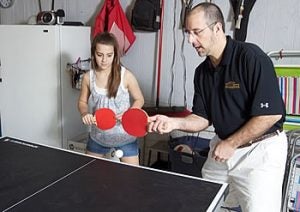Advice from a patient helps doctor, family stay close

Eve Ellis and her father, Dr. Tommy Ellis, play pingpong at their home Sunday, March 13. An essay Ellis wrote about the pingpong table received a writing award from a medical trade magazine. Photo by Cliff Hollis
WINTERVILLE, N.C. — Dr. Tommy Ellis sees a lot of patients in his family medicine practice at East Carolina University. Almost always, he is able to help them.
One day, however, the tables turned.
Marilyn Love, 70, a longtime patient of Ellis’, was at his office for a routine appointment. As the visit concluded, Love asked the doctor if there were anything she could do for him.
The question caught Ellis by surprise. He’s supposed to be the one making suggestions and coming up with answers, he thought. But since Love had grown children of her own, Ellis, 44, decided to ask for advice on raising teenagers.
Love’s response was swift: Buy a pingpong table.
A few days later, she followed up with a letter repeating the suggestion and adding other advice to help connect with his children.
That story, the pingpong table and the effect it’s had on Ellis’ family are featured in an essay he wrote for the Feb. 25 issue of Medical Economics, a bimonthly trade magazine for physicians. It earned Ellis the 2011 grand prize in the magazine’s writing contest for doctors.
On a recent Sunday evening, the family gathered in the garage and driveway, playing pingpong and shooting basketball. Since getting the table, Ellis said, friends and neighbors now drop by to play a few games. A youth Bible-study group meets there Wednesday nights. The crowds got so big the family put tables and chairs in the garage, giving it a restaurant/game room feel.
The pingpong table has done what Love said it would: contribute to conversation in a way TV-watching and music earbuds can’t.
“The pingpong kind of breaks the ice a little,” Ellis said. “Sometimes, things come up about friendships and the things that come up with friendships, the drama that comes up with friendships, peer pressure,” he said. The Ellises have four children — three sons and one daughter — ages 12-17.
Parents also wonder if they are setting the right type and number of boundaries, his wife added. Talking with teens about the topics isn’t easy. But playing a game helps ease the atmosphere.
“They don’t feel like they’re being grilled,” Amy Ellis said of her children. “It’s a way to get them talking.”
She said that as her husband’s career advances, so does the age of his patients – and the knowledge they can potentially offer.
“There’s something to learn from every interaction if we listen as much as we talk,” she said. “There’s a lot of wisdom in that experience people just don’t tap into.”
Daughter Eve, 12, agreed. “I thought it was neat they were giving him advice instead of him giving them advice,” she said.
More about Ellis, including his full essay, is available online at http://digital.healthcaregroup.advanstar.com/nxtbooks/advanstar/medec_20110225/index.php.